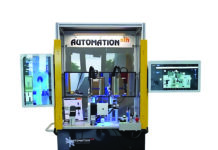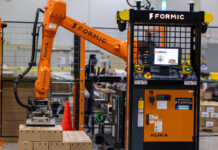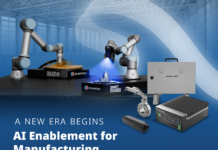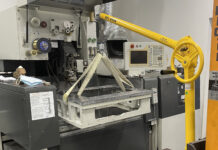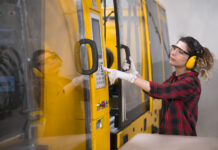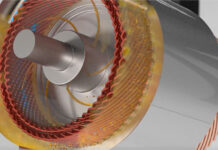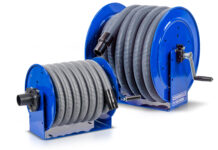ECM technology from EMAG – Cutting Edge Innovation in Aero Engine Manufacturing
The aircraft manufacturing industry is under continuous development pressures uncommon in many other industries. Legislation is becoming stricter about the CO 2 emission of aircrafts, and rapid growth is expected throughout the industry, continuing to push the development of aero engines into the spotlight. In order to keep up with industry demands, aero engines need to show a reduction in fuel consumption, while simultaneously guaranteeing greater propulsion values. To reach these specifications, it’s obvious that the components used in the engines will need to change. These components are made out of extreme materials that have to withstand a high amount of pressure. The question is: how can these materials be machined with speed, precision and process integrity? The EMAG experts have a cutting edge solution: their electro- chemical machining (ECM) technology. ECM machines from EMAG allow customers new opportunities in aero engine manufacturing.
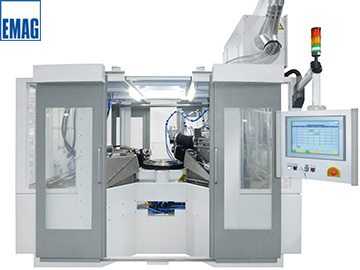
There is one important correlation found in the manufacture of aero engines: the higher the temperatures generated by the engine, the more efficient it is. At increased temperatures, the aircraft will consume less fuel over the same distance and increase its overall flying range. It’s easy to imagine what this means for the materials used in an aero engine. The higher temperatures irrevocably lead to the use of extremely hard materials that will perform better under stress. While increasing in hardness, the component must also be flexible and very precise to meet the high-demands of the industry. These changes are the only way to achieve a goal set over a decade ago by the aero engine sector to create a 20% reduction in both CO 2 emission and fuel consumption.
An Exceptional Option for the Aero Engine Manufacturing Industry
The aero engine industry is not the only industry that experiences these high demands, the automotive industry are also held to the same standards. However, in aircraft manufacturing industry, failing to hit the mark has more serious consequences. Experts estimate that over the next two decades air traffic will increase by five percent per annum. In fact, Airbus has predicted that there will be a demand for 7,600 new engines every ten years. Although this offers great opportunities, to conquer new markets, the aero engine manufacturers will have to continue to develop industry improvements.
What are the manufacturing solutions that ensure the new high-performance engine components can be produced efficiently? ECM and PECM technology (Precise Electro-Chemical Machining) from EMAG is an outstanding option! This process is perfect for the development of complex components produced with demanding materials, as it machines these materials while minimizing tool wear. Once machining is complete, the surfaces of components are left with outstanding quality – no burrs and no changes in the microstructure of the material. In the past, traditional methods such as using cutting processes could lead to a number of problems including negative effects on the microstructure of the material, decrease tool life and high infeed rates required to make the machine economically viable. With these shortcomings, it should come as no surprise that the demand for ECM is increasing for the manufacturing of aero engines. Since EMAG released this technology in 2009, a number of their machines have been delivered to the supply chain for aero engine manufacturers, where they are used to machine central components, such as blisks, disks and individual blades in nickel alloys, at high speeds and with increased precision.
EMAG’s Selective Development
The electro-chemical process ensures a particularly soft removal of the material. The workpiece acts as positive anode and the tool as negative cathode. Between the two flows an electrolyte solution that dissolves metal ions on the workpiece. The contour of the cathode and the workpiece with their active, current-conducting sectors, are matched, to ensure that the material removal on the workpiece leads to the desired contour of the component. Contours, channels, grooves and cavities are generated without touching the component – with the highest possible precision and minimal tool wear. With the launch of PECM technology, EMAG has expended ECM technology. In the PECM machines, the gap that the electrolyte solution flows through is particularly narrow; and the flow is optimized with a mechanical oscillation. This guarantees a particularly effective and precise removal material. Blisk production is an amazing example of the possibilities when using ECM or PECM technology.
For the machining of turbine blade disks, the specialists from EMAG have developed an ECM system equipped with 11 machining stations that carry out drilling, contouring, radius machining and polishing operations all on one machine. The high-tensile Inconel material is machined at a feedrate of 5 mm per minute, without burrs or negative thermal effects. The tolerances achieved are between 0.1 and 0.3 mm. The life expectancy of ECM tools is very high, ensuring that the tooling costs in production are much lower than those using cutting tools for the process.
Establishing Feasibility in the Laboratory
The experts at EMAG ECM, with headquarters in Gaildorf, near Schwäbisch Hall, Germany, offer complete and comprehensive service of this process. Instead of a supplier, EMAG sees themselves as their customers’ partners in development. At the center of activities is an on-site laboratory, which offers the possibility to carry out feasibility studies and preliminary investigations on single- and multi-axes machines. In addition, the laboratory also offers comprehensive measuring systems (roughness, contour, coordinates) to ensure workpiece quality.
The laboratory not only establishes the feasibility of a project, but also the cost- benefit ratio of the process in regards to the specific component and the material it is made of. With this testing, the customer will find out what component tolerances and cycle times they can expect to achieve.
The general philosophy of the South German machine builder is another aspect of importance to aero engine manufacture. Right from the beginning, the company relies on a very close relationship with its customers. The process is firmly implanted in the company’s strategy. This also means that, where required, customers receive in-depth training, to enable them to design and manufacture their own tools to suit their particular requirements.
Partnering with RWTH Aachen
That the technological demands of the experts at EMAG ECM are so innovative and state-of- the-art, that they must work closely with the machine tool laboratory at the RWTH (Rhenish-Westfalian Technical College) Aachen. Here experimental analyses for the electro-chemical machining of materials establish the feasibility of the process and where improved cathode designs are simulated. The comprehensive objective is integrated optimization. The process is continuously improving in order to continue to meet the challenge of new materials and changing component geometries.
Large batch sizes, hard materials, precision results without negative effect on the material, perfect surfaces – allow outstanding market opportunities for the machine builder and their technology in aero engine manufacturing. The company offers a modular machine concept that can be quickly and easily customized to suit individual component requirements. The customer also benefits from the enormous amount of EMAG expertise in the development and manufacture of machine tools. Pivotal innovations, such as Mineralit machine base, intelligent soft- and hardware interfaces and effective automation solutions are part of the company’s developments. It ensures that EMAG ECM can create customized (P)ECM turnkey solutions. In fact, the machine builders at Gaildorf are convinced that their technology will prove essential for many future innovations in aero engine manufacturing. The clamor for the ECM process has begun.
About EMAG
The success of EMAG’s strategy lies in the fact that a medium-sized corporation can still react to customer requirements with flexibility and attention to the long term prospect. After all, clients are looking for answers to the crucial question of how to improve their output and the quality of their production – and to do so with space-saving machinery that will not let them down, even after many years of use. EMAG is the world’s most important manufacturer of CNC vertical turning machines.
For more information, visit www.emag.com.

